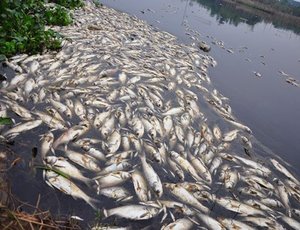Mass Fish Deaths and the Future of Environmental Regulation in Vietnam
 By: George Llewellyn-Jones
By: George Llewellyn-Jones
Environmental laws are on the agenda after public criticism has put the government on the back foot for failing to protect the environment from industrial pollution. Rare protests have demanded more environmental accountability on business activities and the government has suggested there may be retroactive regulatory measures taken.
The recent attention has come about after millions of dead fish washed up along coasts in Central Vietnam last month. Locals are not daring to eat them as they are thought to be contaminated and there is a ban in force for the use of dead fish in animal feed.
An investigation has been launched to determine the cause of the fish deaths but locals have been quick to attribute the blame to polluted waters. Dead fish were first reported five kilometers from the Son Duong Port in Vung Ang Economic Zone.
Earning US $6 billion from seafood exports in 2015, Vietnam is heavily reliant on its fishing industry. In the months ahead, companies will need to be more diligent in their environmental considerations as authorities are expected to be more stringent in their assessment of environmental impacts in the wake of recent events.
 RELATED: Dezan Shira & Associates’ Corporate Establishment Services
RELATED: Dezan Shira & Associates’ Corporate Establishment Services
Vietnamese Updates to Environmental Protection
Effective from January 1, 2015, Vietnamese authorities have upgraded the Environmental Protection Law, bringing in a more comprehensive set of regulations in line with international standards. Regulations govern waste management in all stages of projects, from generation, reduction, sorting, collection, transportation, reuse, recycling and destruction. There are also new provisions on hazardous waste management.
According to Article 18 of the revised environmental protection law, projects are defined into three categories:
- Projects subject to the decision on investment intentions made by the National Assembly Government and the Prime Minister
- Projects that use land parcels situated in wildlife sanctuaries, national parks, historical – cultural monument, world heritage sites, biosphere reserves and, scenic beauty areas that have been ranked
- Projects that can cause bad effects on the environment.
Updates indicate that all economic activities must be conducted in accordance with locally approved plans regarding environmental protection. Environmental impact assessment reports are also required prior to the commencement of projects. Article 22 lists the contents of these reports which importantly must include plans to minimize the impact of projects on the environment and surrounding communities.
A secondary issue that is likely to see increased scrutiny by authorities in the months ahead is that of waste management. Under updated guidelines, hazardous waste management contents must be stated in environmental protection master plans. Furthermore, provincial-level people’s committees will no longer be permitted to license the treatment of hazardous wastes. Instead, this will now fall under the remit of the Ministry of Natural Resources and Environment.
Regarding the import of scrap materials, discarded materials imported into Vietnam must comply with environmental technical regulations and be on the list of permissible scrap materials sanctioned by the Prime Minister. Organizations and individuals must import discarded materials only for use as production materials and pay collateral for them. When importing scrap material, importers must also have separate warehouses and storing yards which satisfy environmental protection conditions for storing discarded materials.
 Related: The Seafood Industry in Vietnam – Aquaculture, Five Year Plans, and the TPP
Related: The Seafood Industry in Vietnam – Aquaculture, Five Year Plans, and the TPP
Beyond recent updates to the environmental protection law, Vietnam has adopted a number of measures in recent years targeting potential threats. An initial measure has been the introduction of the polluter pays-principle via an Environment Protection Tax (EPT). Launched in 2012, the tax is aimed at goods which may cause damage to the environment, such as gasoline, oil and grease, coal and certain chemicals.
Besides EPT, Vietnam has also introduced Environment Protection Fee (EPF). The EPF is levied on businesses engaging in the mining of natural resources including crude oil, natural gas, coal gas, and both metallic and non-metallic minerals. Rates vary depending on the type of mineral. The law also sees criminal liability for crimes increased with punishments of up to 10 years imprisonment or a fine of up to VND 10 billion.
As the impact and responsibility surrounding recent fish deaths becomes clear, the response of governing officials will likely solidify. In the near to medium term, it is highly likely that firms will find themselves facing increased enforcement and potential regulatory uncertainty should regulations undergo further updates. To stay up to date with changes and to ascertain the level of enforcement that will be carried out by authorities, it is highly encouraged that investors monitor Vietnam’s environmental compliance landscape closely. Should any concerns arise, it is advisable that investors bring this up with government officials or engage the service of professional investment practitioners within the country.
|
Asia Briefing Ltd. is a subsidiary of Dezan Shira & Associates. Dezan Shira is a specialist foreign direct investment practice, providing corporate establishment, business advisory, tax advisory and compliance, accounting, payroll, due diligence and financial review services to multinationals investing in China, Hong Kong, India, Vietnam, Singapore and the rest of ASEAN. For further information, please email vietnam@dezshira.com or visit www.dezshira.com. Stay up to date with the latest business and investment trends in Asia by subscribing to our complimentary update service featuring news, commentary and regulatory insight. |
![]()

Annual Audit and Compliance in Vietnam 2016
In this issue of Vietnam Briefing, we address pressing changes to audit procedures in 2016, and provide guidance on how to ensure that compliance tasks are completed in an efficient and effective manner. We highlight the continued convergence of VAS with IFRS, discuss the emergence of e-filing, and provide step-by-step instructions on audit and compliance procedures for Foreign Owned Enterprises (FOEs) as well as Representative Offices (ROs).
 Navigating the Vietnam Supply Chain
Navigating the Vietnam Supply Chain
In this edition of Vietnam Briefing, we discuss the advantages of the Vietnamese market over its regional competition and highlight where and how to implement successful investment projects. We examine tariff reduction schedules within the ACFTA and TPP, highlight considerations with regard to rules of origin, and outline the benefits of investing in Vietnam’s growing economic zones. Finally, we provide expert insight into the issues surrounding the creation of 100 percent Foreign Owned Enterprise in Vietnam.
 Tax, Accounting and Audit in Vietnam 2016 (2nd Edition)
Tax, Accounting and Audit in Vietnam 2016 (2nd Edition)
This edition of Tax, Accounting, and Audit in Vietnam, updated for 2016, offers a comprehensive overview of the major taxes foreign investors are likely to encounter when establishing or operating a business in Vietnam, as well as other tax-relevant obligations. This concise, detailed, yet pragmatic guide is ideal for CFOs, compliance officers and heads of accounting who must navigate Vietnam’s complex tax and accounting landscape in order to effectively manage and strategically plan their Vietnam operations.
- Previous Article Managing Corporate Name Infringement in Vietnam
- Next Article Vietnam Market Watch: HSBC Growth Projections, Bank Hacking Attempts, and Obama’s Upcoming Trip to Vietnam

































